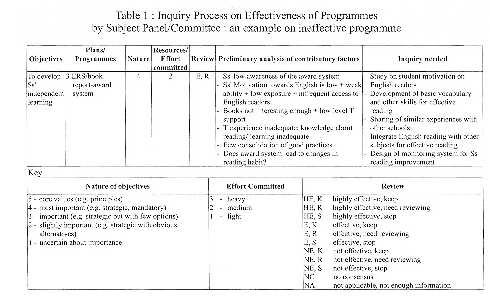

Wong Ka Sing
School Development Officer
![]()
Foreword
 |
To develop a school based self evaluation model is an essential objective in the Accelerated Schools Project (ASP). However, an inappropriate design of self-evaluation model may jeopardize the staff-relationship and working environment or may invite unnecessary strategic reaction from the teachers in school.
Unity of Purpose is one of the primary principles of ASP. Only by establishing clear vision and purpose in school could the valuation standard and procedures be developed. In the last two issues of ASP bulletin, the procedures of development of self-evaluation model: from stock-taking, vision-building, priorities setting, goals and action mapping exercise (GAME) and Keep-Improve-Start-Stop (KISS) model have been introduced. The following activities could be conducted after the GAME model.
After the "GAME", teachers should have a better picture of the 'energy distribution' with respect to the school's areas of concern. They should also be aware of the need for a better understanding of their teaching effectiveness and student learning after an overview of their investments in non-teaching domains as revealed partly through the GAME model. The next step is the development of a routine in school for subject groups to generate relevant data for members to examine the effectiveness of the teaching duties and student learning.
1. Ranking effectiveness:
The first step is to evaluate the school's yearly programme plan for individual subjects. The panel members should try to come to a consensus on a ranking of the effectiveness of their programmes. Then a detailed study on factors leading to the most successful/least successful programmes would shed some light on the nature of problem that the subject is addressing (Table 1).
At this point, an external observer such as the School Development Officer (SDO), may help by bringing in alternative perspectives and considerations. The SDO should perform the role of a mediator in the event of conflicts and/or teachers seeking expert advice. Providing information on norms and practices in other subjects and schools would be helpful because soft-mode bench marking is lacking in many schools.
2. Inquiring factors leading to effective/ineffective learning outcomes
When the above steps are taken, a common professional language may evolve in the school to reflect the expertise development of teachers around a core knowledge base. Consensus on areas of concern would now be easier to reach. Strategic plans would have wider acceptance and programmes with improved effectiveness.
The whole exercise outlined is basically a process for teachers' professional expertise to interact around their daily routine experiences. Parameters are set with joint ownership and endorsement. Procedures and standards evolve with school culture. Signals and standards generated in this process should be useful for teachers and school to assess their progress in meeting goals.
Assessment of programme and teaching effectiveness is sensitive. Early development of the system should be appropriately paced to allow teachers and administrators ample time for a thorough understanding of the rationale behind various procedure & practices. Teachers' endorsement and participation in the process is critical. Hence, schools entrenched with conflicting values and non-collegial power relationships should not take up this procedure hastily.
The establishment of a system of internal evaluation with features outlined above requires heavy initial investment of time, effort and expertise. Much negotiations and persuasion are needed at the start. Release of time and resources for the development of this process should be done through priority setting and slowing down of less urgent programmes. It is pointless if a system is built which costs more than the benefits it brings.
